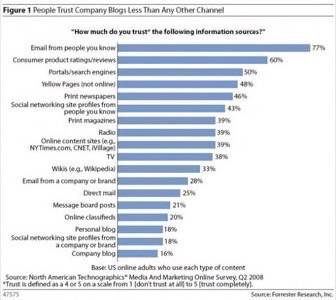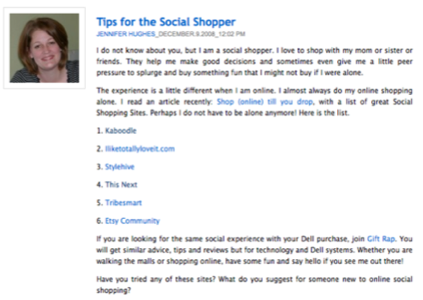According to a new report by Forrester Research, corporate blogs are the least trusted information source of all. Only 16% of online consumers who read corporate blogs say that they trust them. You can grab a copy of this report for free by filling in a form at Forrester. The full trust scale is below, with ‘Email from people you know’ the most trusted at 77%.

We have some reservations about the findings of the report – and to prove our point in this post we check out a good and bad example of corporate blogging, from Dell and the Walmart blog respectively.

The report stated that regular blog readers and bloggers trust company blogs a little more, and those that trust corporate blogs are more likely to trust other media. Consumers are skeptical, says Forrester, because they view corporate blogs as unbalanced. So their advice is: if you’re a company thinking of starting a blog “about your company and its products”, you probably shouldn’t bother. For those companies that already have blogs, Forrester says that “if your blog generates leads, links, positive reviews, buzz, or PR, it’s probably worth keeping.” Otherwise shut it down.
The Forrester report was noted by the Blog Council, an organization which is focused on “the business of blogging and social media at the corporate level.” The council listed a number of its own member blogs which they (naturally) regard as trustworthy:
- Rubbermaid
- Microsoft
- AccuQuote
- Analog Devices
- Cisco Systems
- Coca-Cola
- Dell
- Direct2Dell
- General Electric
- General Motors
- Graco (Newell Rubbermaid)
- Intel
- Lenovo
- Mayo Clinic
- Molson
- Nokia
- Orange Business Services
- Petro-Canada
- Pitney Bowes
- Robert Wood Johnson Foundation
- Rubbermaid
- SAP
- Sharpie (Newell Rubbermaid)
- Walmart
- Wells Fargo
Our Take
The Forrester report seems to be having its cake and eating it too – if your corporate blog is successful and meets its goals, keep it going; if it doesn’t, can it. But that is true of any blog, corporate or not.
To the larger point of whether corporate blogs are trustworthy, it depends on so many things that it’s difficult to make a sweeping judgement. For example, I trust some Microsoft blogs more than others – depending on the person blogging and perhaps even the department they work for. It depends on the style of blogging, the content that’s published, the way the blog is promoted, and so on.
It also depends on the brand of the company itself. Let’s take Walmart as an example. It’s one of the corporate blogs listed above by The Blog Council. It’s fair to say that Walmart isn’t the most loved brand in the U.S., so I’m probably less likely to trust its corporate blog as a result. The style of blogging unfortunately doesn’t do any favors to Walmart either. Would you trust the following product recommendation from Walmart’s Checkout blog?
“As you know, I am an Apple fanatic, but this deal even has me looking twice. Our computer buyer has put together this!

The Blitz ad says $350 but Santa called and challenged him to do better. So now Sam’s is at new price of $345 and an additional $20 case value is included. This is an 8.9″ WSVGA Acer CrystalBrite TFT LCD (1024 x 600) with an Intel Atom Processor, 1GB Memory, 120GB Hard Drive and a Crystal Eye Webcam. WOW. That information tells me that Sam’s really put together a great item for our Members! This unit is great for surfing the net, e-mail and is a nice netbook.“
Clearly the above product recommendation is insincere and not to be trusted, which makes it less likely that I’ll trust other Walmart blog posts.
But there are much better examples of corporate blogging that I would trust. For example this post at a Dell blog:

Yes it pimps a Dell product, but it’s not looking to ‘put one over you’ as reader. This particular post is recommending a Dell social shopping app that might be useful to its customers, so it’s information that readers of the Dell blog probably want to know. Also helpful is its quotation of genuinely interesting and relevant external content, and asking the readers for their suggestions. It’s the little things like that which lead to trust. If all Dell blog posts are like that, trust would build pretty quickly among their readers.
Conclusion
The Forrester report in the end is a little unsatisfactory. Trust has to be earned and some corporations are actively making the effort to do that. As a result, there are some corporate blogs that you trust more than others. To claim that corporate blogs are the least trustworthy information source on the planet seems unfair – and untrue in many cases. This is one instance where the stats don’t tell the full story, in our view.
If you’re a company wanting to find out how to do corporate blogging the right way, there are many great blogs that cover this – a couple of ones we recommend are the blogs of Debbie Weil and Jeremiah Owyang (who happens to work at Forrester and who has a post up on the report).
What do you think? Do you trust corporate blogs?
Image: gtmcknight

















